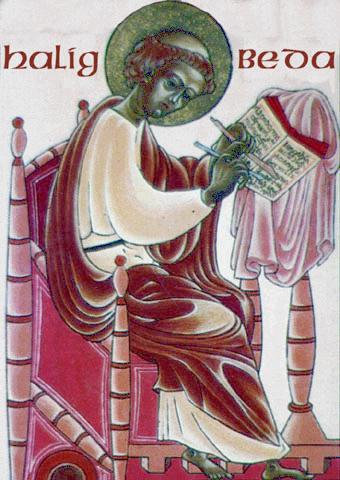 Bede (IPA: /ˈbiːd/) (also Saint Bede, the Venerable Bede, or (from Latin) Beda (IPA: [beda])), (c. 672 or 673 – May 25, 735), was a monk at the Northumbrian monastery of Saint Peter at Wearmouth, today part of Sunderland, and of its companion monastery, Saint Paul's, in modern Jarrow (see Wearmouth-Jarrow), both Northumbria. He is well known as an author and scholar, and his most famous work, Historia ecclesiastica gentis Anglorum (The Ecclesiastical History of the English People) gained him the title "The father of English history".
Bede (IPA: /ˈbiːd/) (also Saint Bede, the Venerable Bede, or (from Latin) Beda (IPA: [beda])), (c. 672 or 673 – May 25, 735), was a monk at the Northumbrian monastery of Saint Peter at Wearmouth, today part of Sunderland, and of its companion monastery, Saint Paul's, in modern Jarrow (see Wearmouth-Jarrow), both Northumbria. He is well known as an author and scholar, and his most famous work, Historia ecclesiastica gentis Anglorum (The Ecclesiastical History of the English People) gained him the title "The father of English history".He was the first person to write scholarly works in the English language, although unfortunately only fragments of his English writings have survived. He translated the Gospel of John into Old English, completing the work on the very day of his death. He also wrote extensively in Latin. He wrote commentaries on the Pentateuch and other portions of Holy Scripture. His best-known work is his History of The English Church and People. It gives a history of Britain up to 729, speaking of the Celtic peoples who were converted to Christianity during the first three centuries of the Christian era, and the invasion of the Anglo-Saxon pagans in the fifth and sixth centuries, and their subsequent conversion by Celtic missionaries from the north and west, and Roman missionaries from the south and east. His work is our chief source for the history of the British Isles during this period. Fortunately, Bede was careful to sort fact from hearsay, and to tell us the sources of his information. He also wrote hymns and other verse, the first martyrology with historical notes, letters and homilies, works on grammar, on chronology and astronomy -- he was aware that the earth is a sphere, and he is the first historian to date events Anno Domini, and the earliest known writer to state that the solar year is not exactly 365 and a quarter days long, so that the Julian calendar (one leap year every four years) requires some adjusting if the months are not to get out of step with the seasons.
Almost all that is known of Bede's life is contained in a notice added by himself when he was 59 to his Historia (Book V, Chapter 24), which states that he was placed in the monastery at Wearmouth at the age of seven, that he became deacon in his nineteenth year, and priest in his thirtieth. He implies that he finished the Historia at the age of 59, and since the work was finished around 731, he must have been born in 672/3. It is not clear whether he was of noble birth. He was trained by the abbots Benedict Biscop and Ceolfrid, and probably accompanied the latter to Wearmouth's sister monastery of Jarrow in 682. There he spent his life, prominent activities evidently being teaching and writing, the two of most interest to him. There he also died, on May 25, 735, and was buried, although his body was later transferred to Durham Cathedral.
Bede of Jarrow - 27 May - Priest, Teacher, and Historian
The Collect.
ALMIGHTY God, who hast enriched thy Church with the singular learning and holiness of thy servant Bede: Grant us to hold fast the true doctrine of thy Son our Saviour Jesus Christ, and to fashion our lives according to the same, to the glory of thy great Name and the benefit of thy holy Church; through the same Jesus Christ our Lord. Amen.
The Epistle - Malachi 3:16-18.
THEN they that feared the Lord spake one to another: and the LORD hearkened, and heard it, and a book of remembrance was written before him for them that feared the Lord, and that thought upon his name. And they shall be mine, saith the Lord of hosts, in that day when I make up my jewels; and I will spare them, as a man spareth his own son that serveth him. Then once more shall ye discern between the righteous and the wicked, between him that serveth God and him that serveth him not.
The Gospel - St. Matthew 13:47-52.
JESUS said, The kingdom of heaven is like unto a net, that was cast into the sea, and gathered of every kind: which, when it was full, they drew to shore, and sat down, and gathered the good into vessels, but cast the bad away. So shall it be at the end of the world: the angels shall come forth, and sever the wicked from among the just, and shall cast them into the furnace of fire: there shall be wailing and gnashing of teeth. Jesus saith unto them, Have ye understood all these things? They say unto him, Yea, Lord. Then said he unto them, Therefore every scribe which is instructed unto the kingdom of heaven is like unto a man that is an householder, which bringeth forth out of his treasure things new and old.
Reference and Resources:
http://www.commonprayer.org/calend/propers/bede.cfm
http://en.wikipedia.org/wiki/Bede
http://elvis.rowan.edu/~kilroy/JEK/05/25.html
http://orthodoxwiki.org/Bede
†
No comments:
Post a Comment